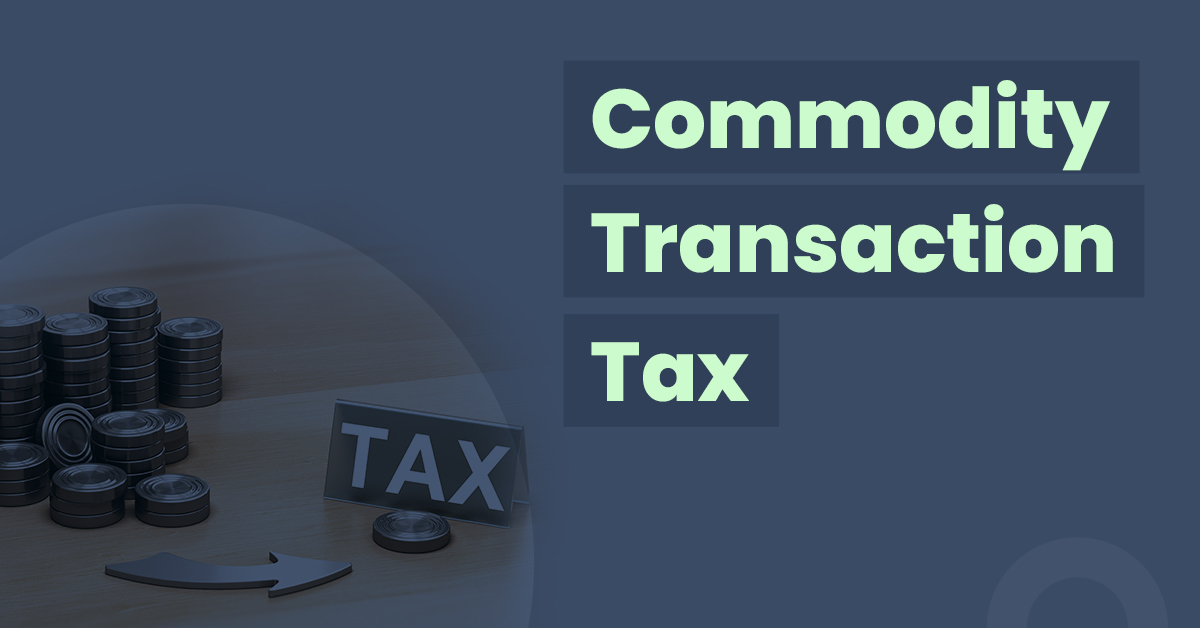All You Need to Know about Commodity Transaction Tax (CTT)


Commodity trading involves buying and selling commodities such as rice, wheat, rubber, aluminium, crude oil and precious metals. In India, physical commodities are traded on spot exchanges, while commodity derivatives are traded on commodity exchanges.
Tax expenses are an integral part of trading. Previously, commodities used to be exempt from taxes. However, after the Union Budget 2013–2014, the government introduced Commodity Transaction Tax (CTT).
This blog will go into detail about commodities transaction tax.
What Is Commodity Transaction Tax (CTT)?
Commodity Transaction Tax applies to the trade of non-agricultural commodities in India. The purpose of its introduction was to increase financial revenue for the government and increase transparency in trade.
CTT was implemented during the Union Budget 2013–2014. It was introduced based on the concept of Securities Transaction Tax (STT), which is for equities due to the claim that there is no distinction between commodity derivatives and equities other than the underlying asset. It also helped in introducing some parity between the commodity and equity markets.
Taxes are implied on both the buyers and sellers of commodities and are determined by the contract size. From April 1 2020, index futures and options are also liable to CTT.
A few commodities which are liable to CTT are listed below:
- Base Metals: Lead, Zinc, Nickel, Brass, Copper, etc.
- Bullion: Gold, Silver, Platinum, etc.
- Energy Resources: Crude Oil, Coal, Uranium, Natural Gas, etc.
As per information by the Multi Commodity Exchange (MCX), a total of 61 food commodities are currently exempted from CTT. These include almonds, barley, cardamom, castor seed, cloves, cotton, etc.
Also Read: Top Commodity Trading Strategies in India
How Is Commodity Transaction Tax Levied?
Commodity Transaction Tax in India is imposed on buyers and sellers of commodity future contracts. The amount is based on the contract size.
Commodity transactions are taxed are the same as STT for equities, i.e., 0.01% of the trade price. CTT can also be shown as a deduction if one can prove that their commodity transactions are a part of business income.
Let us illustrate an example of CTT calculation below:
Suppose you purchase a commodity worth ₹50,000 and sell it in the future at ₹70,000. Then, the CTT will apply to the trading amount of ₹70,000 at 0.01%. Hence, the CTT will be ₹7. The same tax will also be levied on the seller.
Commodity Transaction Tax Rates
CTT applies to all parties participating in the commodity trade. The table below summarises the types of commodity tax levied by MCX (Multi Commodity Exchange of India).
| Serial Number | Taxable Transactions | Payable On | Rate | Payable By |
| 1 | Sale of a commodity derivative (other than exempted agricultural commodities) | Price at which commodity derivative is traded | 0.01% | Seller |
| 2 | Sale of an option on commodity derivatives | The option premium | 0.05% | Seller |
| 3 | Sale of an option on commodity derivatives, where the option is exercised | The settlement price | 0.0001% | Buyer |
List of agricultural commodities now exempt from CTT.
Impact of Commodity Transaction Tax
After the introduction of commodity transaction tax, the trading volumes on various commodity exchanges, such as MCX, fell by almost 50–60%. As a result, many small-scale traders who formerly made a reasonable contribution to the trading volume have also left the market.
Many traders have argued that the introduction of CTT will hurt the country’s emerging commodity markets. However, the Indian government has upheld its decision to treat the commodity market the same way as stock markets and keep speculation in check.
Also Read: Everything to Know about Taxes on Silver in India
Final Word
Commodity Transaction Tax has heavily impacted the commodity trade in India. Even though its introduction aimed to increase the government’s revenue, it has increased the transaction costs for traders who already need to pay brokerage fees and deposit margins.
Frequently Asked Questions
Has GST made commodity trading more convenient?
GST helps in aiding electronic spot markets such as e-NAM. GST combines all the various state taxes into one, smoothens the process of trading.
Are losses incurred from commodity trading also liable to taxation?
Commodity trading losses are not taxable. On the other hand, profits from both speculative and non-speculative trading are taxable. However, under Indian income tax legislation, you can offset your losses using your gains depending on the situation.
Is commodity trading speculative or non-speculative trading?
Commodity trading can be treated as both speculative or non-speculative trading, depending on its settlement. As per industry practices, when no physical delivery of goods occurs it is considered a speculative trading. If physical delivery of goods is involved, then it is treated as non-speculative trading.




